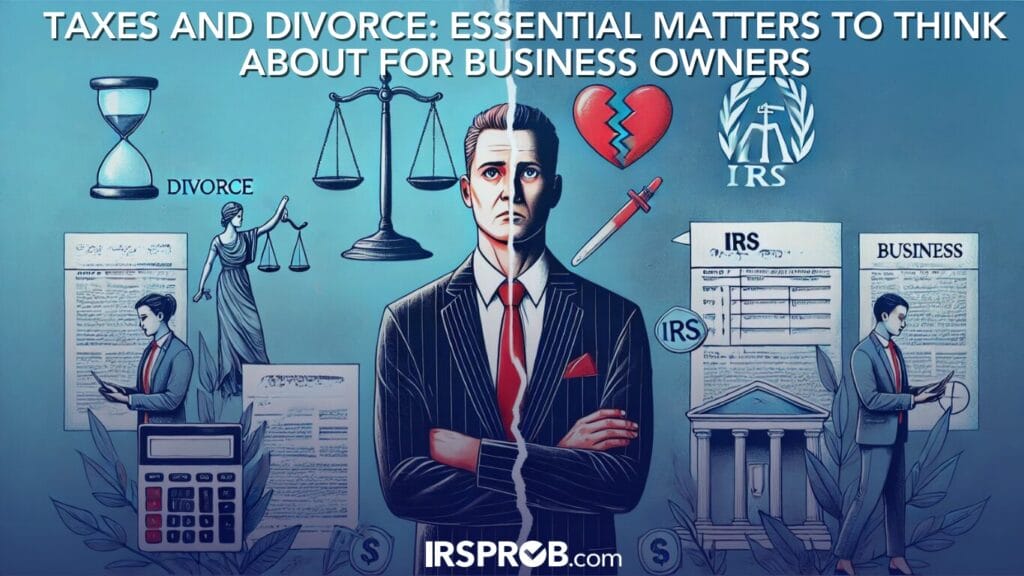
Divorce is a life-altering event that can have significant financial implications, particularly when it comes to taxes. As a business owner, understanding how your tax situation may change due to divorce is crucial to ensuring compliance with tax laws and avoiding unexpected liabilities. Below are the primary areas you should focus on when navigating divorce and taxes.
1. Filing Status
Your marital status as of December 31 of the tax year determines your filing status. If your divorce is finalized by the last day of the year, you must file as “Single” or, if you qualify, as “Head of Household.” However, if your divorce is not final by year-end, you will need to file as “Married Filing Jointly” or “Married Filing Separately.” It is essential to choose the correct filing status, as it impacts your tax liability and eligibility for certain credits and deductions.
For example, filing as “Head of Household” offers tax benefits like a higher standard deduction and potentially lower tax rates compared to filing as “Single” or “Married Filing Separately.” However, to qualify, you must provide more than half the cost of maintaining a home for a dependent.
2. Joint Tax Liability
Even after divorce, you may still be held jointly and individually liable for taxes, interest, and penalties from joint returns filed during your marriage. This means that if there are any outstanding tax liabilities from joint filings, the IRS can pursue either spouse for the full amount owed, regardless of what the divorce decree states.
Business owners should be especially mindful of this, as complications like unpaid business taxes could exacerbate post-divorce financial burdens. If you’re concerned about potential liabilities, consider requesting “Innocent Spouse Relief,” which can help shield you from responsibility for your ex-spouse’s tax misdeeds.
3. Handling Dependents
After divorce, determining which parent claims the child as a dependent for tax purposes can be tricky. Typically, the custodial parent (the one the child lives with for the majority of the year) claims the child as a dependent. However, the custodial parent can sign IRS Form 8332, allowing the non-custodial parent to claim the exemption instead. This is particularly relevant for divorced business owners who may want to maximize tax savings by strategically allocating dependent-related tax benefits.
4. Property Settlements
If you transfer property, such as a business or real estate, to your spouse as part of a divorce settlement, the transfer is typically tax-free, provided it occurs within one year of the divorce or is directly related to the divorce. However, business owners should be careful when structuring these agreements to avoid triggering unintended tax consequences. If you’re transferring a business, ensure proper documentation and valuation to prevent future tax disputes.
5. Alimony and Child Support
The tax treatment of alimony (spousal support) changed with the 2017 Tax Cuts and Jobs Act. For divorces finalized after December 31, 2018, alimony payments are no longer deductible by the payer and are not considered taxable income for the recipient. In contrast, child support payments have never been deductible by the payer or taxable to the recipient.
For business owners, understanding these distinctions is crucial when structuring divorce settlements. While you can no longer deduct alimony payments, considering other tax planning strategies, such as adjusting business-related deductions, might help mitigate the financial impact of these payments.
6. Estimated Taxes and Business Income
If you made joint estimated tax payments during the year of your divorce, you and your spouse will need to agree on how to split these payments. In the absence of an agreement, the IRS will divide the payments based on each spouse’s share of total tax liability. This can be particularly complex for business owners with fluctuating income, as divorce often coincides with changes in income and tax obligations.
Furthermore, if your divorce occurs during a period when your business is facing a significant tax event (such as the sale of assets or an audit), it’s essential to work with a tax professional to ensure you remain compliant with your estimated tax obligations.
7. Legal Fees
In general, legal fees incurred during divorce are not deductible. However, there are exceptions. For example, legal fees paid for tax advice or to obtain or collect alimony may be deductible. Business owners should keep detailed records of all legal expenses to determine whether any of the fees qualify for deductions under IRS guidelines.
Additional Considerations for Business Owners
For business owners going through a divorce, the potential tax implications are vast and complex. Not only are you dealing with the division of personal assets, but your business may also be subject to division. Here are a few more considerations:
- Business Valuation: A thorough and accurate valuation of your business is essential in divorce proceedings. The IRS may require documentation of the business’s fair market value, which could impact both your tax liability and the division of assets.
- Buy-Sell Agreements: Ensure that your business has a buy-sell agreement in place, which outlines how ownership will be transferred in the event of divorce. This can prevent disputes over business ownership and help maintain stability within the company.
- Retirement Plans: Divorce can affect any retirement plans you hold through your business. If your spouse is entitled to a portion of your retirement benefits, you may need to divide the assets through a Qualified Domestic Relations Order (QDRO), which ensures tax-deferred status for the transferred portion of the retirement account.
Conclusion
Divorce can complicate your tax situation, especially for business owners. From filing status to handling business assets and dependents, understanding the tax implications of divorce is crucial to avoiding costly mistakes. Working with a tax professional is highly recommended to navigate this complex area effectively and ensure you’re taking advantage of all available tax planning opportunities.
Remember, tax laws are ever-changing, so staying updated on current legislation and seeking advice tailored to your specific circumstances will help ensure a smoother transition post-divorce.








